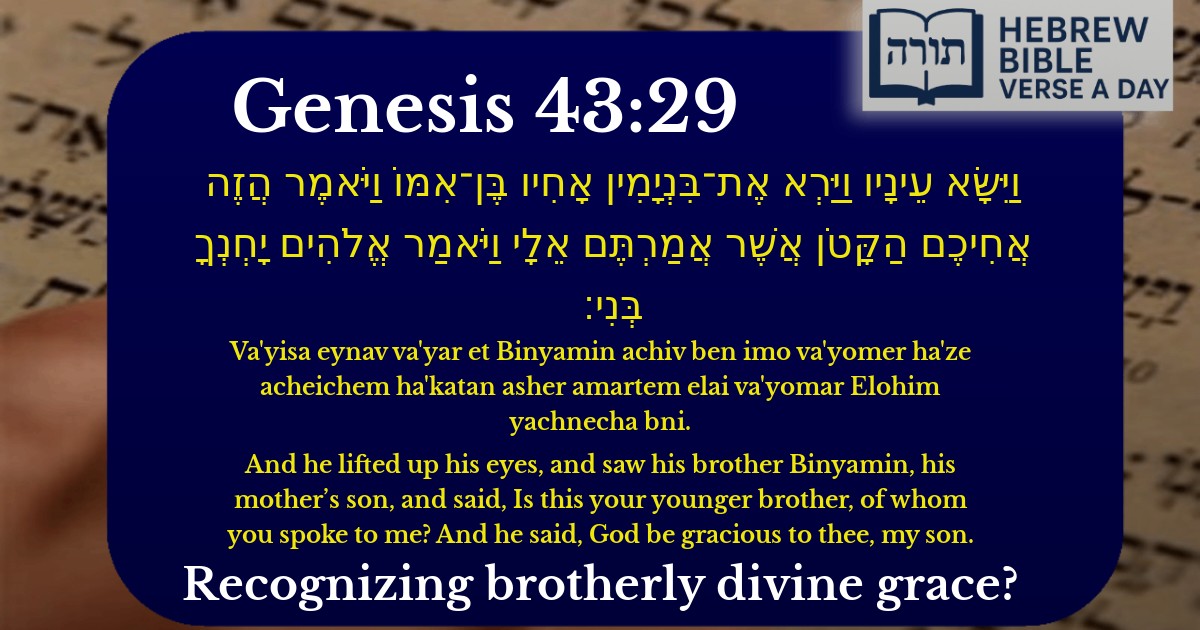Join Our Newsletter To Be Informed When New Videos Are Posted
Join the thousands of fellow Studends who rely on our videos to learn how to read the bible in Hebrew for free!
Hebrew Text
וַיִּשָּׂא עֵינָיו וַיַּרְא אֶת־בִּנְיָמִין אָחִיו בֶּן־אִמּוֹ וַיֹּאמֶר הֲזֶה אֲחִיכֶם הַקָּטֹן אֲשֶׁר אֲמַרְתֶּם אֵלָי וַיֹּאמַר אֱלֹהִים יָחְנְךָ בְּנִי׃
English Translation
And he lifted up his eyes, and saw his brother Binyamin, his mother’s son, and said, Is this your younger brother, of whom you spoke to me? And he said, God be gracious to thee, my son.
Transliteration
Va'yisa eynav va'yar et Binyamin achiv ben imo va'yomer ha'ze acheichem ha'katan asher amartem elai va'yomar Elohim yachnecha bni.
Hebrew Leining Text
וַיִּשָּׂ֣א עֵינָ֗יו וַיַּ֞רְא אֶת־בִּנְיָמִ֣ין אָחִיו֮ בֶּן־אִמּוֹ֒ וַיֹּ֗אמֶר הֲזֶה֙ אֲחִיכֶ֣ם הַקָּטֹ֔ן אֲשֶׁ֥ר אֲמַרְתֶּ֖ם אֵלָ֑י וַיֹּאמַ֕ר אֱלֹהִ֥ים יׇחְנְךָ֖ בְּנִֽי׃
וַיִּשָּׂ֣א עֵינָ֗יו וַיַּ֞רְא אֶת־בִּנְיָמִ֣ין אָחִיו֮ בֶּן־אִמּוֹ֒ וַיֹּ֗אמֶר הֲזֶה֙ אֲחִיכֶ֣ם הַקָּטֹ֔ן אֲשֶׁ֥ר אֲמַרְתֶּ֖ם אֵלָ֑י וַיֹּאמַ֕ר אֱלֹהִ֥ים יׇחְנְךָ֖ בְּנִֽי׃
🎵 Listen to leining
Parasha Commentary
📚 Talmud Citations
This verse is not quoted in the Talmud.


Yosef's Emotional Encounter with Binyamin
The verse describes Yosef lifting his eyes and seeing Binyamin, his full brother from the same mother, Rachel. Rashi (Bereshit 43:29) explains that Yosef was overcome with compassion upon seeing Binyamin because he was reminded of their shared mother, Rachel, who had passed away. The phrase "בֶּן־אִמּוֹ" ("his mother’s son") emphasizes their unique bond, as they were the only two sons of Rachel.
Yosef's Question and Its Implications
Yosef asks, "הֲזֶה אֲחִיכֶם הַקָּטֹן" ("Is this your younger brother?"). The Kli Yakar (Bereshit 43:29) suggests that Yosef was testing his brothers to see if they harbored resentment toward Binyamin, as they had once resented him. By referring to Binyamin as "your brother" rather than "my brother," Yosef subtly gauged their attitude toward their youngest sibling.
The Blessing: "אֱלֹהִים יָחְנְךָ בְּנִי"
Yosef blesses Binyamin with "God be gracious to thee, my son." The Ramban (Bereshit 43:29) explains that this blessing was prophetic, alluding to the future greatness of Binyamin’s descendants, such as Mordechai and Esther. The term "יָחְנְךָ" ("be gracious") hints at divine favor, which would manifest in Binyamin’s tribe being the only one to remain loyal to the House of David during the split of the kingdoms (see Melachim I 12:21).
Midrashic Insights
Brotherly Reconciliation
The Or HaChaim (Bereshit 43:29) highlights that Yosef’s emotional response and blessing demonstrated his desire for unity among the brothers. By showing special kindness to Binyamin, Yosef began the process of healing the fractures in their family, paving the way for their eventual reconciliation.